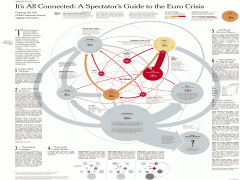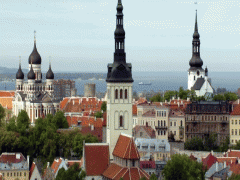
(WSJ) “Economists at Harvard University and Massachusetts Institute of Technology have just released what they claim to be the crystal ball of economics: a model for predicting a nation’s future growth more accurately than any other techniques out there.”
” ‘The Atlas of Economic Complexity’ ranks 128 nations based on their ‘productive knowledge’ — the skills, experience and general know-how that a given population acquires in producing certain goods. Countries with a high score in the report’s ‘economic complexity index’ have acquired years of knowledge in making a variety of products and goods and also have lots of room for growth. Essentially, the more collective knowledge a country has in producing goods, the richer it is — or will be.”
” ‘The essential theory … is that countries grow based on the knowledge of making things,’ Mr. Hausmann said in a phone interview. ‘It’s not years of schooling. It’s what are the products that you know how to make. And what drives growth is the difference between how much knowledge you have and how rich you are.’ ”
“Thus, nations with extensive productive knowledge but relatively little wealth haven’t met their potential, and will eventually catch up, Mr. Hausmann said. Those countries will experience the most growth through 2020, according to the report.”
Full story: ‘Complexity’ Predicts Nations’ Future Growth (WSJ)
(p63 of Study) ” The countries in the top ten of this ranking [of Economic Complexity] are Japan, Germany, Switzerland Sweden, Austria, Finland, Singapore, Czech Republic, the UK and Slovenia. Immediately after the top 10 we have France, Korea and the US. Of the top 20 countries, half are in Western Europe, 3 are in East Asia, and surprisingly 4 are in Eastern Europe. Israel and Mexico close the list of the top 20. These are countries with productive structures that are able to hold vast amounts of productive knowledge, and that manufacture an export a large number of sophisticated goods. At the bottom the economic complexity ranking we have Papua New Guinea, The Republic of Congo, Sudan, Angola and Mauritania. .. Interestingly the least complex countries in Western Europe are Portugal (35) and Greece (53), two countries who’s high income cannot be explained by either their complexity or their natural resource wealth. We do not think that this unrelated to their present difficulties: their current income has been propped up by massive capital inflows and, as these decline to more sustainable levels, the internal weaknesses come to the fore.”
(p69 of Study) “Here countries are sorted according to their per capita growth potential [to 2020], which is estimated from the mismatch between a country’s current level of aggregate output (GDP per capita) and their level of economic complexity. China, India and Thailand are at the top of this ranking, since they are countries with economies that are remarkably complex, given their current level of income, and are expected to catch up faster than other developing nations. Next come Belarus, Moldova, Zimbabwe, Ukraine and Bosnia-Herzegovina, five countries where the current level of income is dramatically lower than what one would expect given their productive capabilities. This ranking shows that the two regions of the world where the potential of per capita growth is higher are East Asia and Eastern Europe. At the bottom of this ranking we have Sudan, Angola and Mauritania. These are developing countries where the complexity of their economies does not provide a basis for future economic growth, and, where changes in income are dominated by fluctuations in the price and volume of natural resource activities.”
Site for the Atlas Study: The Atlas of Economic Complexity (Mapping Paths to Prosperity)



 RSS feed for comments on this post.
RSS feed for comments on this post.













